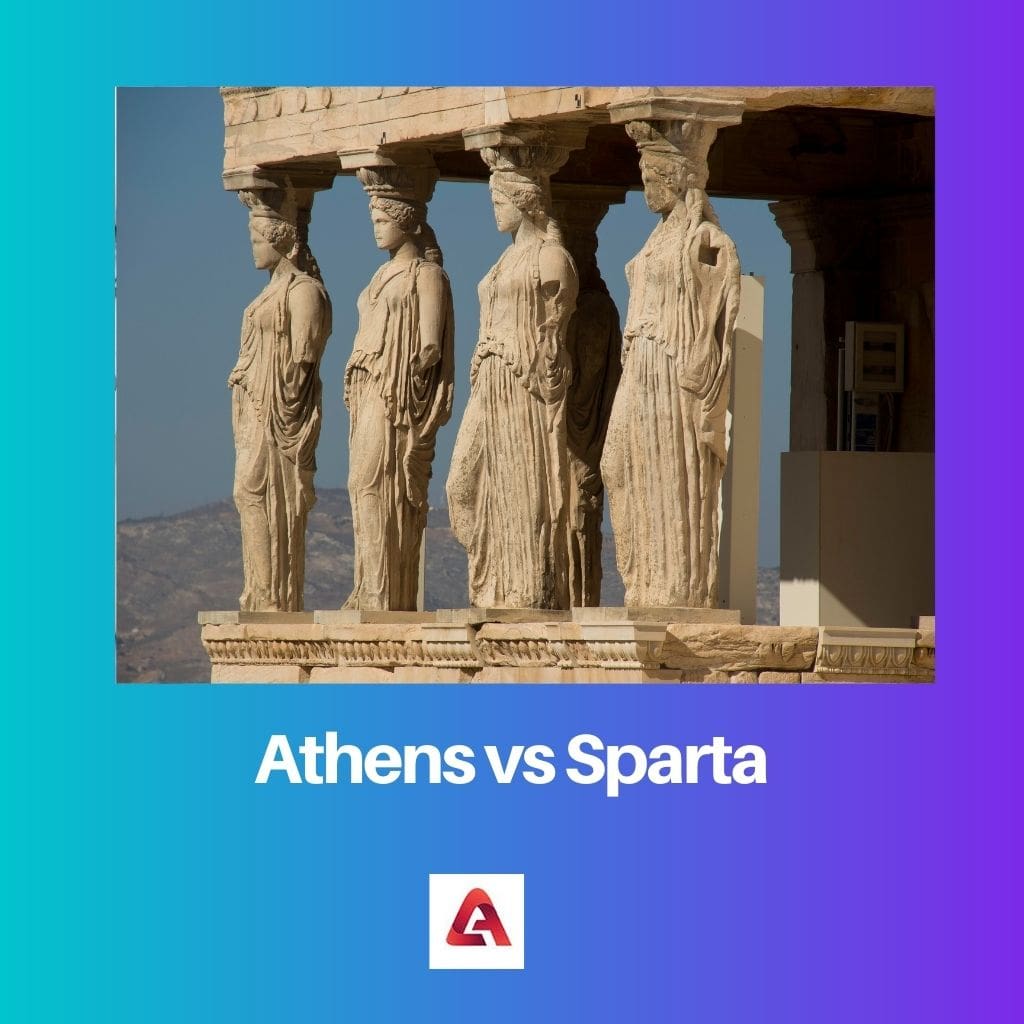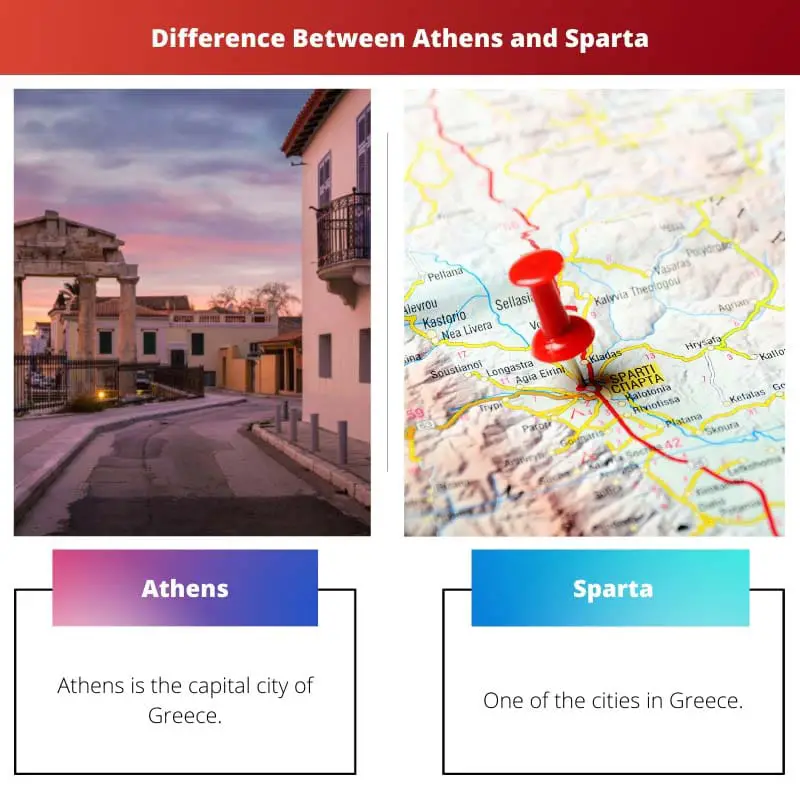Athens and Sparta were ancient Greek city-states with distinct political systems: Athens embraced democracy, fostering intellectual and artistic achievements, while Sparta was known for its militaristic society, emphasizing discipline and military prowess.
Key Takeaways
- Athens was an ancient Greek city-state known for its focus on democracy, arts, philosophy, and education, fostering a culture of intellectual growth and creativity.
- Sparta was an ancient Greek city-state recognized for its militaristic society, strict discipline, and emphasis on physical strength and combat training.
- The primary difference between Athens and Sparta lies in their political systems, societal values, and cultural focus, with Athens prioritizing democracy and intellectual pursuits. At the same time, Sparta emphasized military strength and discipline.
Athens vs Sparta
Athens was home to some renowned philosophers, such as Socrates and Plato. Sparta had a unique social structure where a select group held great power and influence. The citizens of Sparta were required to serve in the military until 60 years of age.

However, the above is not the only difference. A comparison between both the terms on specific parameters can shed light on subtle aspects:
Comparison Table
| Feature | Athens | Sparta |
|---|---|---|
| Government | Democracy (Direct democracy with citizen assembly) | Oligarchy (Dual kingship with council of elders) |
| Economy | Trade and agriculture | Primarily agriculture, with some emphasis on military production |
| Military | Strong navy, citizen-based army with limited training | Powerful land-based army with rigorous training from childhood |
| Culture | Open and progressive, emphasis on philosophy and arts | Conservative and militaristic, emphasis on discipline and obedience |
| Social Structure | Relatively free and diverse, with some slavery | Highly stratified, with citizens, helots (state-owned slaves), and perioeci (free but non-citizen subjects) |
| Education | Highly valued, with emphasis on intellectual pursuits and rhetoric | Primarily focused on military training and physical fitness |
| Role of Women | More active participation in public life, though still limited compared to men | Confined to domestic roles, with limited involvement in public affairs |
| Art and Architecture | Known for iconic buildings like the Parthenon and Acropolis, focus on beauty and innovation | Simpler and more functional architecture, emphasis on practicality and strength |
| Strengths | Creativity, innovation, intellectual and artistic achievements | Discipline, military prowess, strong social order |
| Weaknesses | Political instability, internal conflicts, reliance on imports | Rigidity, limited economic and cultural development, harsh treatment of non-citizens |
What is Athens?
Athens holds a prominent place in history as Greece’s capital and largest city. Renowned as the cradle of Western civilization, Athens has a rich historical and cultural heritage has significantly influenced philosophy, politics, art, and education.
Historical Background
Athens boasts a history that spans thousands of years, with evidence of human habitation dating back to the Neolithic Age. The city-state of Athens emerged during the Archaic period (c. 800–500 BCE) and became a pivotal center of ancient Greek civilization. It was crucial in developing democracy, philosophy, and the arts.
Political and Philosophical Significance
The Athenian democracy, established in the 5th century BCE, is considered one of the earliest forms of democratic governance. Influential thinkers such as Socrates, Plato, and Aristotle, who lived in Athens during its golden age, made profound contributions to philosophy. The city became a hub for intellectual and artistic pursuits, fostering an environment that laid the foundation for Western philosophy and political thought.
Architectural Marvels
Athens is renowned for its classical architecture, with iconic structures that include the Acropolis and the Parthenon. These ancient monuments, built during the Golden Age of Athens (c. 460–430 BCE), are enduring symbols of classical Greek civilization. The Acropolis, a UNESCO World Heritage site, served as the citadel and sanctuary of the city.
Cultural and Artistic Contributions
The city’s cultural influence extended to literature, theater, and the arts. Playwrights like Aeschylus, Sophocles, and Euripides produced timeless tragedies that continue to be studied and performed today. The Athenian festivals, particularly the Dionysia, were celebrated with theatrical performances, showcasing the significance of drama in ancient Greek culture.
Modern Athens
Athens remains a vibrant metropolis in the modern era, blending its historical charm with contemporary life. The city has faced challenges but has persevered, retaining its status as a cultural and economic hub in the Mediterranean region. Visitors can explore museums, such as the Acropolis Museum, housing artifacts from the city’s ancient past.

What is Sparta?
Sparta was a prominent city-state in ancient Greece, renowned for its unique social and political structure and formidable military prowess. Situated in the southern part of the Peloponnese peninsula, Sparta emerged as a powerful and aggressive society during Greek history’s Archaic and Classical periods. The city-state’s history is intricately linked with its military-centric culture and the legendary Spartan military, known for its discipline and effectiveness in battle.
Spartan Society
Sparta’s societal structure was distinct from other Greek city-states. The Spartans, or Lacedaemonians, were divided into three main classes: the Spartiates, or full citizens and soldiers; the Perioikoi, who were free inhabitants engaged in trade and industry; and the Helots, who were essentially state-owned serfs bound to the land. The Spartiates formed the backbone of the Spartan military and enjoyed a lifestyle characterized by austerity, discipline, and a strong emphasis on physical fitness.
Military Focus
The hallmark of Sparta was its military prowess, and the state prioritized the training and discipline of its citizens for warfare. Spartan men underwent a rigorous and lifelong military education known as the agoge, which began in early childhood and continued through adulthood. The training focused on physical fitness, combat skills, and mental resilience, aiming to produce elite soldiers capable of enduring the hardships of war. The Spartan phalanx, a tightly-packed formation of heavily armed soldiers, became renowned for its effectiveness on the battlefield.
Political Structure
Sparta’s political structure was oligarchic in nature, featuring a dual monarchy with two kings ruling concurrently. The Gerousia, a council of elders, and the ephors, elected officials with significant powers, played crucial roles in the governance of Sparta. The Gerousia provided advice to the kings and had legislative responsibilities, while the ephors managed day-to-day affairs and had the authority to hold kings accountable for their actions. This complex system aimed to maintain a balance of power and prevent the emergence of tyrants.
Peloponnesian War and Decline
Sparta played a prominent role in the Peloponnesian War (431–404 BCE), where it led the Peloponnesian League in opposition to the Delian League led by Athens. Despite emerging victorious, Sparta’s hegemony was short-lived. Internal conflicts, decline in military prowess, and a reluctance to adapt to changing geopolitical realities contributed to Sparta’s eventual decline in the 4th century BCE.
Legacy
While Sparta’s political and military influence diminished over time, its legacy endured through its reputation for military excellence, discipline, and the famous Battle of Thermopylae during the Persian Wars. The unique Spartan way of life continues to captivate the imagination, with Sparta serving as a symbol of martial prowess and discipline in the annals of ancient Greek history.

Main Differences Between Athens and Sparta
- Government:
- Athens: Athens is considered the birthplace of democracy. It had a democratic form of government where eligible citizens participated in decision-making through an assembly. The political system evolved, including key figures like Solon, Cleisthenes, and Pericles.
- Sparta: Sparta had a mixed government system with elements of monarchy, oligarchy, and democracy. The city-state was known for its dual monarchy, consisting of two kings. However, the real power was held by the Council of Elders (Gerousia) and the Assembly of Citizens.
- Society and Values:
- Athens: Athens was known for its emphasis on education, philosophy, arts, and intellectual pursuits. The Athenians valued individualism, freedom of thought, and the pursuit of knowledge. The city-state produced many renowned philosophers, including Socrates, Plato, and Aristotle.
- Sparta: Spartan society was militaristic and focused on discipline, obedience, and physical prowess. The primary goal of the Spartan state was to produce strong and disciplined soldiers. The agoge, a rigorous state-sponsored education and training program, played a crucial role in shaping Spartan citizens.
- Military Focus:
- Athens: While Athens had a strong navy and participated in conflicts, its military focus was less intense than Sparta’s. The Athenian military was largely composed of citizen-soldiers who served part-time.
- Sparta: Sparta was renowned for its powerful land-based military. The Spartan army, composed of professional soldiers called hoplites, was one of the most formidable forces in ancient Greece. Military training and service were lifelong obligations for Spartan citizens.
- Treatment of Women:
- Athens: Women in Athens had limited rights and were primarily confined to the household. They had little participation in public life or political affairs.
- Sparta: Spartan women enjoyed more freedom and were more active in society than their counterparts in other Greek city-states. They received physical education, and some even participated in sports. The goal was to produce healthy and strong offspring.
- Economic System:
- Athens: Athens was a more economically diverse city-state, with trade, commerce, and the arts playing significant roles in its economy. The city-state had a thriving maritime trade network.
- Sparta: Sparta, on the other hand, was primarily focused on agriculture. The helots, a subordinate class, worked the land, allowing Spartan citizens to focus on military training.

- https://eric.ed.gov/?id=ED179128
- https://books.google.com/books?hl=en&lr=&id=kdBvCwAAQBAJ&oi=fnd&pg=PT6&dq=Athens+and+Sparta&ots=OQscbD4Fjw&sig=KWO5FmPrjGT7irRoobP_QuPXmSI

The intricate comparison table sheds light on the nuanced differences between Athens and Sparta, from their governmental structures to their approaches to education and culture. It’s a rich tapestry of contrasting values and societal norms.
Absolutely, Zoe. The comparative analysis underscores the complexity of ancient Greek civilization, highlighting the diverse trajectories of Athens and Sparta. It’s a fascinating study in contrasting societal paradigms.
Indeed, Zoe. The detailed comparison provides valuable insights into the divergent paths of these iconic city-states. The distinctions in their social structures, education, and cultural ethos are particularly intriguing.
The rich historical background of Athens, coupled with its enduring cultural and artistic contributions, cements its position as a cornerstone of Western civilization. The city’s architectural marvels and intellectual legacy continue to inspire and captivate.
Well stated, Mking. Athens’ lasting impact on philosophy, architecture, and governance resonates through the annals of history. The city’s contributions to Western thought are immeasurable.
Absolutely, Mking. Athens’ historical significance and enduring cultural influence epitomize the essence of Greek civilization. Its intellectual and artistic legacy has left an indelible mark on the world.
The comparison between Athens and Sparta offers a comprehensive understanding of their respective strengths and weaknesses, shedding light on their contrasting trajectories. Athens’ focus on creativity and innovation stands in stark contrast to Sparta’s emphasis on discipline and military prowess.
Well said, Sienna. The juxtaposition of their social, political, and cultural aspects unveils the multifaceted nature of ancient Greek civilization. The interplay between creativity and discipline is a compelling study.
Indeed, Sienna. The comparative analysis underscores the diverse socio-political landscapes of Athens and Sparta. It’s a captivating exploration of contrasting ideologies and societal paradigms.
The intricate comparison between Athens and Sparta offers a profound understanding of the divergent trajectories and societal dynamics of these ancient city-states. It’s a compelling testament to the intricacies of ancient Greek civilization.
Indeed, Alison. The comparative analysis provides invaluable insights into the contrasting values and cultural paradigms of Athens and Sparta. It’s a thought-provoking exploration of ancient Greek history.
The historical significance of Athens, as a crucible of Western civilization, cannot be overstated. Its contributions to philosophy, democracy, and the arts reverberate through the annals of history, setting it apart as a beacon of intellectual and creative prowess.
Absolutely, William. The enduring legacy of Athens’ intellectual and artistic achievements remains unparalleled. It’s a testament to the indelible impact of ancient Greek civilization on the world.
The comparison between Athens and Sparta reveals the stark contrast between their political systems, cultural values, and societal focus. Athena’s democracy and intellectual pursuits stand in sharp contrast to Sparta’s militaristic society and emphasis on physical strength.
Indeed, Oliver. It’s fascinating to study how each city-state’s distinct features shaped their historical and cultural identity. The dichotomy between democracy and military might is particularly striking.
The comparison highlights the dichotomous nature of ancient Greek city-states. Athens’ emphasis on arts, philosophy, and political innovation contrasts sharply with Sparta’s militaristic and disciplined society. It’s a testament to the diversity of Greek civilization.
The comparative analysis of Athens and Sparta provides a nuanced understanding of their political systems, cultural ethos, and societal structures. It’s a compelling exploration of the multifaceted nature of ancient Greek civilization.
Absolutely, Wwright. The dichotomy between Athens’ democratic principles and Sparta’s militaristic culture unveils the divergent paths of these iconic city-states. It’s an enlightening study in ancient history.
Well articulated, Wwright. The comparative analysis underscores the dichotomous nature of Greek civilization, presenting a captivating portrayal of contrasting political ideologies and societal values.
Athens and Sparta were both incredible city-states in ancient Greece, but it’s undeniable that Athens’ focus on democracy, the arts, and education set it apart as a center of intellectual growth and creativity. Their contributions to philosophy and art are invaluable.
Absolutely, Peter! The impact of Athens’ cultural influence and philosophy on Western civilization cannot be overstated. It’s fascinating to contrast their achievements with Sparta’s militaristic society.
You’re right, Peter. The legacy of Athens as a cradle of Western civilization and a hub for intellectual pursuits is truly remarkable. It’s what sets Athens apart from other ancient city-states.
Thank you for the informative and enlightening comparison between Athens and Sparta. The dichotomy between democracy and militaristic society offers invaluable insights into the diverse facets of ancient Greek civilization.
An intriguing exploration of the dichotomous political and societal structures of Athens and Sparta. The contrasting values and cultural priorities offer a captivating study of ancient Greek civilization.